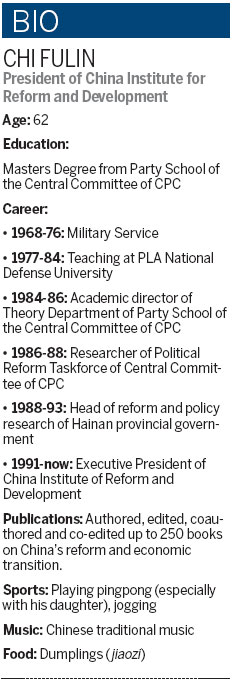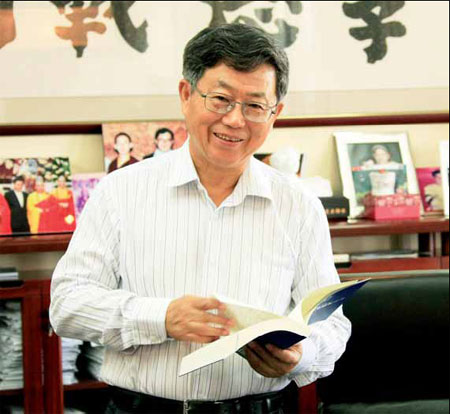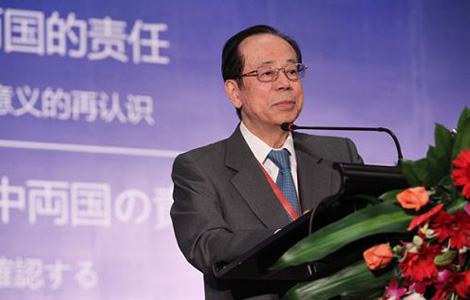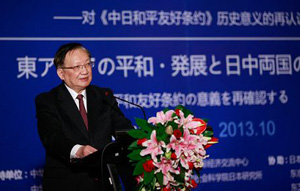An adviser's insights on the road ahead
Updated: 2013-10-25 13:00
By Fu Jing (China Daily Africa)
|
||||||||
|
Chi Fulin says he is impressed by economic developments, measures to reduce red tape and the fight against corruption. Huang Yiming / China Daily |
A meeting in Beijing next month is likely to be historic, think tank head says
"To get rich is glorious" and "Let some people get rich first", China's late leader Deng Xiaoping said 35 years ago when the country began to abandon its planned economy and adopt market-oriented reform and opening up.
Deng, the architect of the country's reform agenda, said the ultimate goal, after a generation of reform, was "shared affluence" throughout the country.
Chi Fulin, a top Chinese political adviser, says it is vital that the shared affluence Deng talked of continues to be a focus at every stage of the country's reform.
"China's leadership now really needs to come up with an action plan for the people to share the country's wealth and affluence," says Chi, president of the China Institute for Reform and Development.
His remarks come as the Third Plenum of the Chinese Communist Party's 18th Central Committee approaches next month.
With a widening gap in China between rich and poor, Chi says: "What people want is a start to a reform agenda for the coming decade."
Chi, one of the country's most well-known advocates of reform, says that putting the country on a more market-oriented path, one that is intertwined with global economics, should be at the top of the plenum's to-do list, which is now being formulated.
"I believe we can expect a lot from the plenum and that the policy portfolio will be historic," Chi says.
"That's mainly because the strategies that have been adopted are likely to transform China from an upper middle-income country into a high-income one over the coming decade."
China's gross national income was $5,800 (4,020 euros) per person last year, the World Bank says. That figure is likely to double in the coming decade even if China maintains only medium-paced economic growth, Chi says.

In a telephone interview with China Daily, Chi says: "The upcoming reform and development stories of China are the same magic as those in the past 35 years, which have seen this country developing from a low-income one to a middle-income one."
Chi, born in 1951, worked as researcher in the reform policy research taskforce of the CPC Central Committee in the 1980s. He later went to Hainan and took charge of the province's policy research, which resulted in the country's biggest special economic zone.
At the beginning of the 1990s, Chi left his government job and set up a think tank that does research on reform and economic transition.
"Of course, our top mission remains very clear: we aim to have our reform proposals heard by Beijing," he says.
Having a think tank on an island about three hours by air from Beijing is useful in "helping people think and create new ideas", he says.
But to persuade government departments to accept the institute's research results, Chi says he has got used to flying to Beijing on average at least once a fortnight.
Chi is a prolific writer and editor on reform. Since the institute was founded in 1991, more than 200 books on reform-related topics have been published, and it has organized about 150 seminars and conferences to promote the reform process. In recent years it has focused on how emerging economies can share development experiences.
Chi's achievements and contribution have been recognized at the highest levels, and he has served two five-year terms as a member of the National Committee of the Chinese People's Political Consultative Conference, the country's highest political advisory body.
This year, he says, he has chaired eight seminars on reform in China. In the coming weeks, as the Third Plenum draws near, Chi will chair a seminar and an international conference on reform and economic transition, he says.
"This year my stay in Beijing is longer than usual because we have taken it as a golden opportunity to advocate China's reform focusing on equality, justice and sustainability."
For him, it is also time to take stock of the lessons learned from reform. With this in mind, the institute has published a collection titled Panorama of Reform and Opening Up in China (1978-2012).
"We regard this year as a fresh and historic beginning," he says.
Much to his delight, China's leaders have lived up to people's expectations on reform and development, he says, and a consensus has been reached at the highest echelons that reform must continue.
Chi says he bases this conclusion on the new visions, strategies and actions that President Xi Jinping and Premier Li Keqiang have talked of and demonstrated since they took power early this year.
Chi says he has been impressed by new developments in economics, measures taken to reduce government red tape and the fight against corruption.
Since Li became premier, Chi says, he appears to have hit the road running to implement the leadership's development agenda, and has shown courage and determination that mark him out to become a reforming premier in the years ahead.
Formulating a program of reform is riddled with difficulties, particularly in today's economic environment, Chi says.
In the first half of this year, Chi says, he invested a lot of time and energy in looking into several questions. The first of these were on how the country can reap a further development dividend through deepened reform, and on the need for recalibrating strategies on urbanization, investment and state sector expansion to sustain long-term stable growth and social equality.
Another important matter was a reform action plan he has proposed to the country's leaders, which he completed in June and titled Reforms capable of outpacing crises.
He believes China's economic sustainability has suffered from critical structural problems. Consumption that has been lower than it should be and shortages of resources and energy have long held back growth, and industrial upgrading has been slow, he says, and now the disparity between incomes is growing, fueling social conflict.
Meanwhile, as the government has been preoccupied with economic matters, corruption has become widespread. "Fortunately, the new leadership has responded to these challenges," Chi says.
In his proposals on dealing with such problems, he has listed 30 actions or reform measures for the coming five years. As the Central Committee of the Party has entrusted a special taskforce to draft the country's reform agenda, Chi says his proposals have been used as background reports for the writing team.
"The upcoming reform campaign is pressing and challenging, and the roadmap needs wisdom and foresight."
Reform should focus on sorting out what roles the government and the market should play, coordinating the interests of social groups and fighting corruption, he says.
Very soon China will further reform its pricing mechanism on resources and let the market have more say; market-oriented reforms on interest rates and the exchange rate will be carried out, and in most of the areas in which a monopoly exists, private and foreign investors will be given the same access as state-owned enterprises.
"I think these reforms will be implemented soon after the Third Plenum," Chi says.
Steps will be taken to tackle corruption head on and to reduce government involvement in economic activities and ensure transparent management of governmental organizations, he says.
Government officials should be required to publicly divulge their wealth, he says.
"In that way all power will be exercised in broad daylight. I think that will gradually happen."
fujing@chinadaily.com.cn

 Serena beats Li Na for WTA title
Serena beats Li Na for WTA title
 Nuclear submarine fleet comes of age
Nuclear submarine fleet comes of age
 5 pharmacies begin to sell baby formula
5 pharmacies begin to sell baby formula
 The suave style of America's dapper dynasty has arrived
The suave style of America's dapper dynasty has arrived Mother and four children stabbed to death in New York
Mother and four children stabbed to death in New York
 China Fashion Week S/S 2014: day 2
China Fashion Week S/S 2014: day 2
 Demonstrators protest against govt surveillance in US
Demonstrators protest against govt surveillance in US
 Where art thou, my love?
Where art thou, my love?
Most Viewed
Editor's Picks

|

|

|

|

|

|
Today's Top News
NQ Mobile hits back after US stock plunge
Obama aware of spying on Merkel: German paper
Cousin killed mom, 4 kids
High speed versus history
States gear up for symposium
Film finds a hip-hop-tai chi connection
Study shows PM1 most harmful
Jewelry exhibit dazzles Southern California
US Weekly

|

|







